8+ Sample Restaurant Management Plan
-
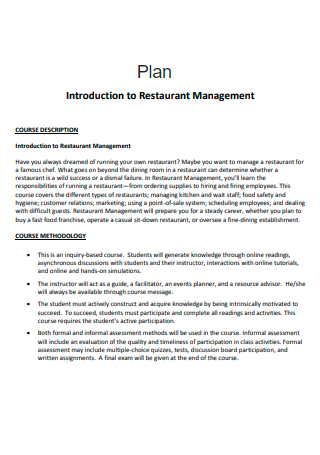
Restaurant Management Plan Template
download now -
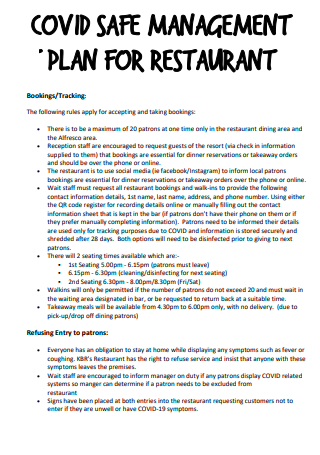
Restaurant Safe Management Plan
download now -
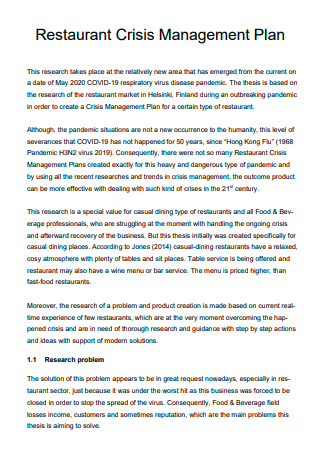
Restaurant Crisis Management Plan
download now -
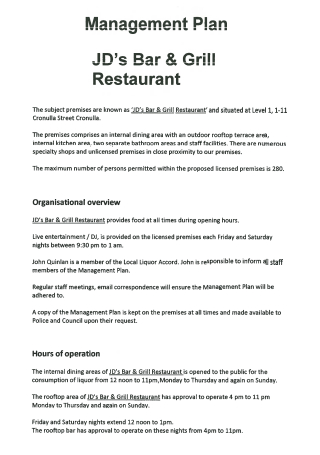
Bar and Grill Restaurant Management Plan
download now -
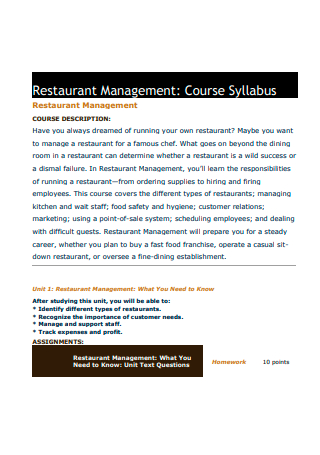
Restaurant Management Plan Example
download now -
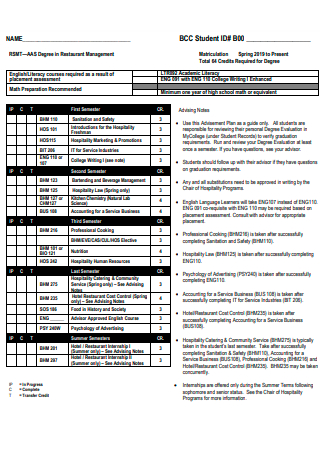
Restaurant Management Plan in PDF
download now -
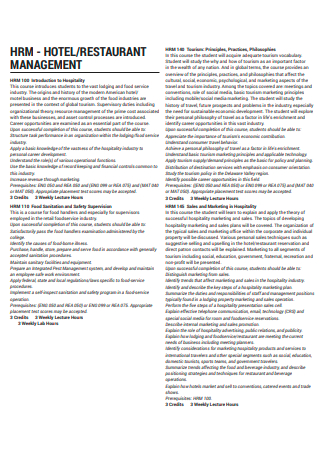
Hotel Restaurant Management Plan
download now -
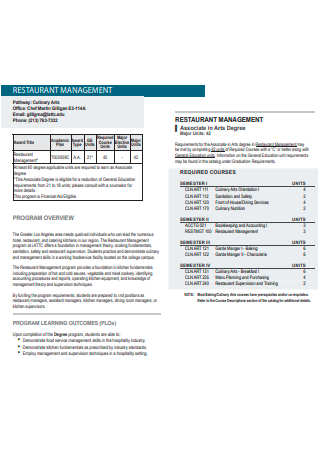
Printable Restaurant Management Plan
download now -
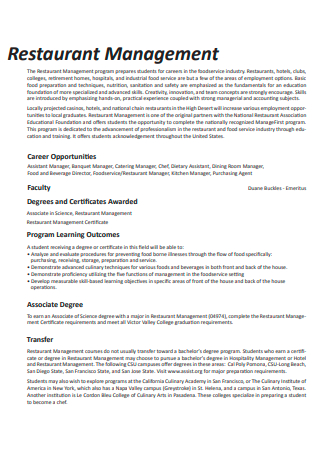
Simple Restaurant Management Plan
download now
FREE Restaurant Management Plan s to Download
8+ Sample Restaurant Management Plan
What Is a Restaurant Management Plan?
Advantages of Management Plans
Traits of Successful Restaurant Managers
How to Write a Restaurant Management Plan
FAQs
What factors contribute to a restaurant’s success?
What is the hierarchy in a restaurant?
What are the three primary objectives of a business plan?
What Is a Restaurant Management Plan?
A management plan is a component of your restaurant business plan that outlines the specifics that owners and managers will need to keep the operation running properly. The management plan is an internal document, whereas the stakeholder plan is an external one. Coming up with a management plan for a restaurant business is challenging especially if you are new to the industry or unfamiliar with the potential issues your business could face in the future. But this article will help you out through the process of writing a plan as well as providing a restaurant management plan sample for reference.
Advantages of Management Plans
Restaurant management plans can be found in every aspect of a company or restaurant owner’s operations and thus handle a wide range of concerns. Project plans, for example, direct and drive projects to completion, talent management plans prepare for organizational transitions, and incident management plans chart a strategy for catastrophe response. All restaurant management plans have one thing in common where they provide direction for controlling company events. Give this curated list before writing a project management plan for opening a restaurant because it will help you to gain knowledge in planning out the document.
Traits of Successful Restaurant Managers
Managing a restaurant is a demanding task. Long hours, a fast-paced environment, and regular interaction in close and cramped quarters make more sense for certain personality types and qualities. Restaurant executives demonstrate a wide range of management abilities. You can distinguish individuals who exhibit these traits and attributes that could make a difference between hiring a new manager to hire someone that could not step up to the task. Although, be open-minded because some individuals can be trained and can quickly learn of these traits.
How to Write a Restaurant Management Plan
Handling a restaurant business is already stressful as it is so writing a plan may be challenging. To ease up your worries, you can use the templates provided in this article so you won’t have to worry about layout additionally you can view an example of a management plan for a restaurant and use it as a reference.
Step 1: Executive Summary
The executive summary’s purpose is to provide context for the rest of your business plan by providing a high-level overview, or elevator pitch. Because it summarizes what is in the remainder of the business plan, entrepreneurs often finish the executive summary last. Business leaders frequently discuss the mission of their company and the history of the company’s founders. A value proposition, which highlights how the new business idea differs from existing companies on the market that may be competing for the same audience, is frequently found in the executive summary as well.
Step 2: Business Description
While the executive summary should tease out your business, the business description section allows you to go into great detail about your food business concept. Since no two companies are alike, no two business descriptions are identical. The location, the things you will sell, your target clients, the predicted growth, the opportunities your company can have, and finally, the principal partners of your business are all factors to consider when writing this section. Spend time rereading it whenever you need to remind yourself of the final aim of all your hard work.
Step 3: Market Analysis
You must identify your competitors and evaluate your position in the market to be successful in business. You will need to define where your company fits in the market in a market analysis. You might incorporate profiles of your ideal clients in your target market description. You could also add a SWOT analysis, in which you discuss your company’s strengths, weaknesses, opportunities, and threats. This level of detail will demonstrate to investors that you understand your customer and have anticipated their needs in your business plan. The market analysis examines the major trends in the sector and geographical area.
Step 4: Organization and Management Structure
This portion of the business plan allows you to highlight the top-tier talent who will assist you in launching your new restaurant or a change in management. Since an effective management team has the experience to weather harsh situations, funders place such a high value on management. If something isn’t working, such as a specific restaurant menu item, a good manager can assist you with pivoting the concept.
Step 5: Sales Strategies
If you don’t meet your sales targets, your idea won’t be a success. That implies investors will be hesitant to invest unless you can demonstrate that you have innovative ideas for promoting your goods. Begin by deciding on a price point. Consider the prices of beverages and food menu items, as well as how that price point connects to the rest of the restaurant’s operations, and how your pricing compares to the competitors. Consider promotional techniques you may employ to promote your company while it is still in the planning stages, as well as any amazing ideas you wish to explore later. Include these tactics, as well as any other plans you have for your big opening and beyond.
Step 6: Funding and Future Projections
You discuss how much money you will need to start your business in this part. This phase might be difficult for business owners, but as long as you are reasonable and have facts to back up your request it will go well. If you are offering a range rather than a specific number, make sure to include best-case and worst-case scenarios to explain why your maximum and minimum values are what they are. You can discuss your location, build-out, licenses and permits, company insurance, inventory sourcing, hiring, employee training, and other topics in the timeline. To discuss how successful your company will be, use market trends and expected revenue growth.
FAQs
What factors contribute to a restaurant’s success?
A strong business identity, hiring and retaining employees, providing a welcoming environment, becoming familiar with profit and loss accounts, developing a profitable menu, and knowing how to publicize your best-selling items are all important aspects of running a successful restaurant. Furthermore, writing a management plan for the restaurant will significantly improve the operation of the business as you and your staff will have a business plan that can help you out.
What is the hierarchy in a restaurant?
A formal hierarchy may not be necessary for a small, family-owned business. Restaurants generally create numerous interacting hierarchies as they grow, including the culinary staff, front-of-house personnel, and administrative staff. Some restaurateurs, on the other hand, own three, four, or five restaurants. More hierarchy is required at this point. Every restaurant has its hierarchy, which is overseen by the management. A considerably more complicated legal framework than owning just one restaurant may be required by the restaurant group.
What are the three primary objectives of a business plan?
A business plan serves three main purposes such as to develop an effective growth strategy, to determine your future financial needs, and to attract investors including angel investors, venture capitalists, and lenders. Since a business plan aids in the direction of your company’s activities and, if relevant, provides investors and lenders with the information they require to decide whether or not to support your business. A restaurant management plan layout will aid you in the completion of your strategy.
Crisis and risk management are unavoidable and impossible to avoid in any industry you are in. This is why restaurant operations and management business plan examples have been provided for you within this article so you can look at references while writing your plan. Otherwise, you are more than ready to proceed to make one!
